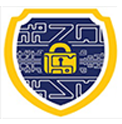Cybersecurity and Digital Forensics Concentration (New)
Students earning the B.S. Computer Science major may or may not also elect to complete a Concentration in Cybersecurity and Digital Forensics. Cybersecurity and Digital Forensics broadly covers the intersecting fields of computer programming, information security, networking, hardware data retrieval and criminal justice. In our modern interconnected society bad actors are constantly attempting to steal valuable information off of network connected devices. It is the job of the cybersecurity professional to attempt to identify, prevent, and catch these bad actors while at the same time defending the network connected devices from these attacks. Additionally, we are seeing that nearly every crime had a digital component and it is the job of the digital forensics professional to find the evidence contained on these digital devices.
This Cybersecurity and Digital Forensics concentration offers students the ability to learn relevant issues, technologies, and principles related to the field of cybersecurity and digital forensics. The concentration will prepare students to enter the high demand field of cybersecurity and digital forensics.
The requirements to complete the Concentration in Cybersecurity and Digital Forensics include all of the requirements for the B.S. Computer Science major. In addition to the requirements for the B.S. Computer Science major, students must complete the following 15 credits with an average grade of C or higher in each course:
Required Courses:
|
Course Number |
Course Title |
Prerequisite(s) |
Credits |
|
CSC 220 |
Introduction to Cybersecurity |
CSC 117 |
3 |
|
CSC 343 |
Introduction to Digital Forensics |
CSC 2XX-Introduction to Cybersecurity |
3 |
|
CSC 345 |
Computer Forensics |
CSC 3XX Introduction Digital Forensics |
3 |
|
CSC 443 |
Network Forensics |
CSC 243 Digital Communications and Networks |
3 |
|
CSC 465 |
Selected Topics in Cyber Security and Digital Forensics |
To be announced with each topic. |
3
|
|
Total: 15 credits |
|
Notes: In order to successfully complete the cybersecurity concentration students must earn a grade of C or higher in each course.
This concentration can be completed on either the St. Thomas or St. Croix campus.
Examples of selected topics are: Information Security, Ethical Hacking, Web-based Security, Penetration Testing, Cryptography, and Malware Analysis.
COURSE TITLE: CSC 220: Introduction to Cybersecurity
COURSE DESCRIPTION: This course will cover topics such as modern cybercrime, cyberterrorism, and cyberwar. These topics will be explored from a technical perspective; explaining not only what it takes to commit one of these acts, but what it takes to defend against and detect such acts (3 credits)
PRE-REQUISITES: CSC 117 Introduction to Programming I or CIS 115
COURSE OVERVIEW: This course uses class discussions to develop the student’s understanding of the broad field of cybersecurity. Students will be required to study definitions and cybersecurity theory, as well as to review case studies before class. Students and the instructor will discuss the roles of the “cyber-defender”, the “cyber-attacker”, and the victim in the context of our interconnected world. The relationship between prevention, detection, and investigation will be studied and considered from a political, technological, economical, and criminal justice perspective. The student will gain valuable “hands-on” experience by completing a semester long project.
COURSE TITLE: CSC 343: Introduction to Digital Forensics
COURSE DESCRIPTION: This course will be an introduction into the world of digital forensics. It will cover topics such as modern computer crimes, network attacks, and cybercrime. These topics will be explored from a technical perspective; explaining not only what it takes to commit one of these acts, but what it takes to defend against and detect such acts. (3 credits)
PRE-REQUISITES: CSC 220 (Introduction to Cybersecurity).
COURSE OVERVIEW: This course uses class discussions to develop the student’s understanding of the broad field of digital forensics. Students will be required to study definitions and digital forensics theory, as well as to review case studies before class. Additionally, the students will be required to study and discuss various case laws and social perspectives as they relate to the field of digital forensics.
COURSE TITLE: CSC 345: Computer Forensics
COURSE DESCRIPTION: This course will cover topics ranging from the history of computer forensics to the science of how an individual can hide data on a computer and how the investigator can find that hidden data. We will also explore new trends in computer crimes. This course will also incorporate hands-on learning through the use of forensics software. (3 credits)
PRE-REQUISITES: CSC 343 Introduction to Digital Forensics
COURSE OVERVIEW: This course uses class discussions, case studies, and hands on labs to develop the student’s understanding of the field of computer forensics. Students will be required to study key terminology of computer operating systems and computer hardware. Additionally, the student will be required to also study key terminology and theory of computer data storage techniques and computer forensics. Students and the instructor will discuss the roles of the computer forensic examiner, the investigative target, and the victim/client in the context of our highly technologically engrained society. The relationship between prevention, detection, and investigation will be studied and considered from a political, technological, economical, and criminal justice perspective. The student will gain valuable “hands-on” experience by completing numerous take-home labs.
COURSE TITLE: CSC 443: Network Forensics
COURSE DESCRIPTION: This course focuses on forensic cybersecurity issues involving access to data stored on networked computer systems and the transmission of data between systems. Topics include detecting and monitoring intrusions of networks and systems, authentication protocols, malware, and intrusion response strategies. (3 credits)
PRE-REQUISITES: CSC 243 (DigitalCommunications and Networks)and CSC 343 (Introduction to Digital Forensics)
COURSE TITLE: CSC 46: Selected Topics in Cybersecurity and Digital Forensics
COURSE OVERVIEW: This course uses class discussions, case studies, and hands on labs to develop the student’s deep understanding of cybersecurity specialized fields. Examples of topics are: Information Security, Ethical Hacking, Web-based Security, Penetration Testing, Cryptography, and Malware Analysis. The student will gain valuable “hands-on” experience by completing numerous take-home lab and by completing a semester long project.

